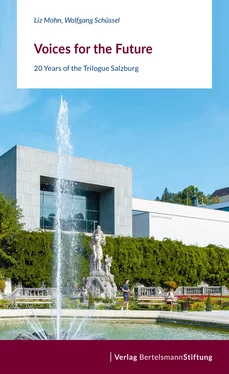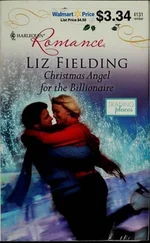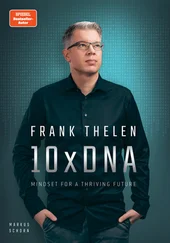Liz Mohn, Wolfgang Schüssel
20 Years of the Trilogue Salzburg

Bibliographic information published by the Deutsche Nationalbibliothek
The Deutsche Nationalbibliothek lists this publication in the Deutsche Nationalbibliografie; detailed bibliographic data is available on the Internet at http://dnb.dnb.de.
© 2022 Verlag Bertelsmann Stiftung, Gütersloh
Responsible: Jörg Habich
Translation: Tim Schroder, Frankfurt am Main
Production editor: Christiane Raffel
Cover Design and Typesetting: Büro für Grafische Gestaltung – Kerstin Schröder, Bielefeld
Printing: Hans Gieselmann Druck und Medienhaus GmbH & Co. KG, Bielefeld
ISBN 978-3-86793-948-5 (print)
ISBN 978-3-86793-949-2 (e-book PDF)
ISBN 978-3-86793-950-8 (e-book EPUB)
www.bertelsmann-stiftung.org/publications
Acknowledgements Acknowledgements For 20 years, the Trilogue Salzburg has been a source of knowledge and inspiration, thanks to the objective, open dialogue it facilitates among political, economic and cultural representatives from all over the world. Its goal has been to make the world a bit better, more peaceful and more humane. Many of the global challenges that concern us today were already being discussed at the Trilogue at a time when few decision makers had them on their agendas – something this publication impressively documents as it looks back over the event’s 20-year history. We would like to thank those who have been part of the Trilogue Salzburg not only for their forward-looking contributions, but also for the intensive, trusting exchange that has given rise to such close ties between the participants. Liz Mohn Wolfgang Schüssel
Preface
Courage in an Age Lacking Courage: An Appeal
Helga Rabl-Stadler
Europe’s Role in the World
Thoughts on Europe’s Role in the World
Ursula Plassnik
Europe’s Economy as the Focus of Discussion
Thoughts on Europe’s Economy – Competitiveness, Sustainability and Globalization
Pascal Lamy
Photo Gallery: 20 Years of the Trilogue Salzburg
On the Future of the European Labor Market
Thoughts on Innovation and Education
Viviane Reding
Challenges for Modern Leadership
Thoughts on the Challenges of Modern Leadership
Marc Elsberg
Values, Responsibility and Social Cohesion
Thoughts on Social Values and Social Cohesion
Edda Moser
Photo Credits
The Trilogue Salzburg
2001–2021
For 20 years, the Trilogue Salzburg has been a source of knowledge and inspiration, thanks to the objective, open dialogue it facilitates among political, economic and cultural representatives from all over the world. Its goal has been to make the world a bit better, more peaceful and more humane. Many of the global challenges that concern us today were already being discussed at the Trilogue at a time when few decision makers had them on their agendas – something this publication impressively documents as it looks back over the event’s 20-year history. We would like to thank those who have been part of the Trilogue Salzburg not only for their forward-looking contributions, but also for the intensive, trusting exchange that has given rise to such close ties between the participants.
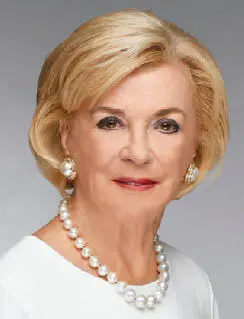
Liz Mohn
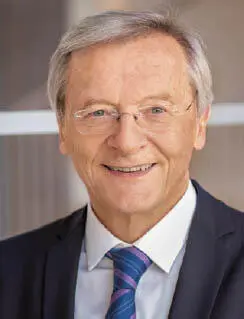
Wolfgang Schüssel
Wolfgang Schüssel, Liz Mohn
The future will be challenging. Not only is that statement true today, during the Covid-19 pandemic, it was true 20 years ago as well. As preparations were being made for the first Trilogue Salzburg, which took place in August 2002, there was no shortage of events suggesting the future would be somewhat bleak, or at least promising to have an enormous impact on what was to come. As an aide to memory, here are a few notable happenings from back then: On September 11, 2001, a terrorist attack leveled the World Trade Center and killed thousands of people. Europe was taking on a new shape as Greece joined the eurozone in 2001, and 12 EU member states introduced the coins and banknotes of their common currency at the beginning of 2002. At the EU summit in Copenhagen in December 2002, the decision was made to welcome 10 new members. In a referendum in Switzerland in 2001, three-quarters of the population voted not to engage in negotiations to accede to the EU – and a few years later, comprehensive bilateral agreements were signed. In 2002, Switzerland became the 190th member of the United Nations. At the end of 2001, China joined the World Trade Organization (WTO).
In the first decade of the new century, there was a spirit of change and optimism in the air, and much was in flux, above all in Europe. We were all looking for ideas that could move us forward. Art in all its guises served as a source of inspiration, but how would it be possible to introduce and implement these ideas in the political and economic arenas? As German philosopher Moritz Carrière put it, “To shape the particular from the idea is the purview of art; to grasp the idea from its various sides by thought, to shape the idea of the state, of art, of humanity itself on the basis of the real and the given, by virtue of foresighted imagination and conclusive reasoning, is the purview of philosophy.”
The Salzburg Festival was conceived during the First World War’s darkest hour; the first Everyman stage was carpentered from boards used for a barrack that housed prisoners of war. Resistance and intrigues notwithstanding, Max Reinhardt succeeded in establishing the summer festival in Salzburg. Reinhardt exemplified the concept of learning by doing, of renewal – even after horrendous catastrophes such as the world war. His credo was, “When one senses that routine has begun creeping in, that’s always the time to try something new.”
All of these considerations gave rise to the Trilogue Salzburg: a gathering of leading individuals from the cultural, economic and political spheres, from as many countries and global regions as possible, who would meet unencumbered by the concerns of daily life to discuss and reflect, inspired by the Salzburg Festival’s magnificent performances. The idea was to combine impulses from all three areas – thus the name “Trilogue” – so that something new could take shape.
The significance of art and culture was and is tangible at the Trilogue Salzburg, as artists make meaningful contributions to reconciliation, understanding and peace, not to mention innovation. Art moves and rattles us – “ice picks against the frozen sea in us,” as Franz Kafka put it. The Trilogue provides art – which must often defend itself from being preempted or appropriated – with a platform of equal standing. One unforgettable moment was the participation of director Andrea Breth, who came to Salzburg with great skepticism, but then enthusiastically embraced both the format and interdisciplinary thinking, enriching them with her comments. Wonderful musicians like Thomas Hampson, Franz Welser-Möst, Clemens Hellsberg, Valery Gergiev, exceptional directors like Jürgen Flimm, brilliant authors like Marc Elsberg and screenwriter Joan Xu have taken part in the Trilogue – which would have been impossible to realize without the active participation of Helga Rabl-Stadler, president of the Salzburg Festival, who has never failed to provide the event’s attendees with a personal introduction to the performance they are about to see.
Читать дальше
